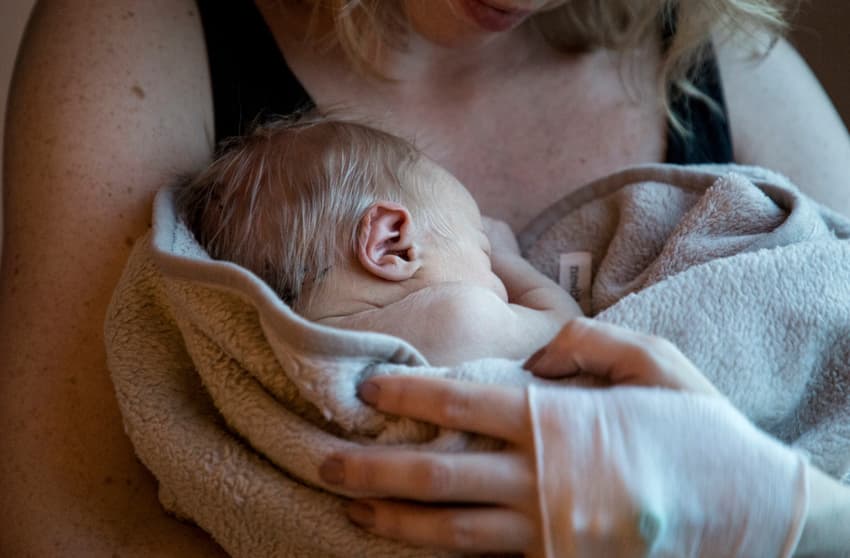'Multiple crises': Why fewer babies are being born in Germany

The birth rate in Germany has fallen significantly over the past two years, according to a study published on Wednesday.
The birth rate has fallen from 1.57 children per woman in 2021 to around 1.36 in the autumn of 2023.
This means that the fertility level is the lowest it has been since 2009, according to figures from a joint publication by the Federal Institute and Stockholm University in the European Journal of Population.
Decline was 'unusually' rapid
The birth rate in Germany initially remained stable and even went up slightly during the Covid pandemic.
In 2021, the highest birth rate since 1997 was registered with 795,492 babies, a phenomenon which many in Germany dubbed “corona babies” since they were conceived and born amid the pandemic.
But the figure then fell to 1.4 from January 2022 as the crisis continued and then recovered at 1.5 children per woman in the summer of 2022. The birth rate then fell again in 2023 and, according to initial estimates, averaged 1.36 from January to November.
READ ALSO: Germany records lowest number of babies born in a decade
"The sharp decline in fertility observed within two years is therefore unusual, as phases of falling birth rates have tended to be slower in the past," the researchers said.
There could be various reasons for the decline: According to the study, the abrupt drop in numbers may have to do with the start of the Covid vaccination campaign nine months earlier.
It’s possible that many women postponed having children because the vaccines were not approved for pregnant women at the time in order to get vaccinated first, said the researchers.
But why did the number of births fall from autumn 2022, when the vaccine was widely available to everyone in Germany?
"In addition to the pandemic, the war in Ukraine, rising inflation and advancing climate change have made people feel insecure," said co-author Martin Bujard.
"In such a time of multiple crises, many do not carry out their desire to have children."
Part of a larger trend?
Whether the current figures herald a general trend towards falling birth rates in Germany or merely reflect a temporary effect is not yet foreseeable, said the researchers.
The birth rate in Germany fluctuated between 1.2 and 1.4 children per woman for four decades after 1975 and was among the lowest in Europe for a long time, according to the institute.
From 2015 to 2021, it was then significantly higher with 1.5 to 1.6 children per woman.
READ ALSO: Everything you need to know about having a baby in Germany
Comments (1)
See Also
The birth rate has fallen from 1.57 children per woman in 2021 to around 1.36 in the autumn of 2023.
This means that the fertility level is the lowest it has been since 2009, according to figures from a joint publication by the Federal Institute and Stockholm University in the European Journal of Population.
Decline was 'unusually' rapid
The birth rate in Germany initially remained stable and even went up slightly during the Covid pandemic.
In 2021, the highest birth rate since 1997 was registered with 795,492 babies, a phenomenon which many in Germany dubbed “corona babies” since they were conceived and born amid the pandemic.
But the figure then fell to 1.4 from January 2022 as the crisis continued and then recovered at 1.5 children per woman in the summer of 2022. The birth rate then fell again in 2023 and, according to initial estimates, averaged 1.36 from January to November.
READ ALSO: Germany records lowest number of babies born in a decade
"The sharp decline in fertility observed within two years is therefore unusual, as phases of falling birth rates have tended to be slower in the past," the researchers said.
There could be various reasons for the decline: According to the study, the abrupt drop in numbers may have to do with the start of the Covid vaccination campaign nine months earlier.
It’s possible that many women postponed having children because the vaccines were not approved for pregnant women at the time in order to get vaccinated first, said the researchers.
But why did the number of births fall from autumn 2022, when the vaccine was widely available to everyone in Germany?
"In addition to the pandemic, the war in Ukraine, rising inflation and advancing climate change have made people feel insecure," said co-author Martin Bujard.
"In such a time of multiple crises, many do not carry out their desire to have children."
Part of a larger trend?
Whether the current figures herald a general trend towards falling birth rates in Germany or merely reflect a temporary effect is not yet foreseeable, said the researchers.
The birth rate in Germany fluctuated between 1.2 and 1.4 children per woman for four decades after 1975 and was among the lowest in Europe for a long time, according to the institute.
From 2015 to 2021, it was then significantly higher with 1.5 to 1.6 children per woman.
READ ALSO: Everything you need to know about having a baby in Germany
Join the conversation in our comments section below. Share your own views and experience and if you have a question or suggestion for our journalists then email us at [email protected].
Please keep comments civil, constructive and on topic – and make sure to read our terms of use before getting involved.
Please log in here to leave a comment.